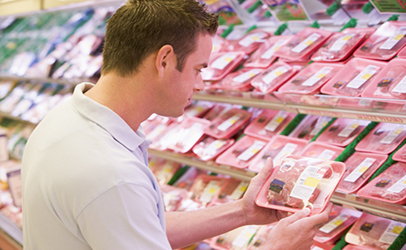Farm Bill: No Repeal of Country-of-Origin Labeling
 Livestock groups are expressing disappointment that “a fix” to country-of-origin labeling (COOL) was not included in the final farm bill and warning that they plan to actively oppose its passage through Congress.
Livestock groups are expressing disappointment that “a fix” to country-of-origin labeling (COOL) was not included in the final farm bill and warning that they plan to actively oppose its passage through Congress.
“COOL is a broken program that has only added costs to our industries without any measurable benefit for America’s livestock producers,” read a letter from the American Meat Institute, the National Cattleman’s Beef Association (NCBA), the National Chicken Council (NCCP), the National Pork Producers Council, the National Turkey Federation and the North American Meat Association, which was sent to farm bill conferees on Monday.
In a press conference Tuesday, NCBA, NCCP and the National Association of Manufacturers indicated concern that COOL will be found non-compliant with international trade obligations by the World Trade Organization (WTO), allowing for Canada and Mexico to impose retaliatory tariffs on agricultural and industrial goods manufactured in the U.S.
“This mandatory label by the U.S. government has failed in every regard,” said NCBA president Scott George. “Instead, it has caused costs to be put on the back of the producer, rancher or farmer like myself, with no benefits.”
Included in the conference report was an application of COOL requirements to venison and a call for an economic analysis of the final rule, which was adopted from a provision in the House bill.
In a news conference held Tuesday with House Agriculture Committee Chairman Frank Lucas (R-OK), Senate Agriculture Committee Chairman Debbie Stabenow (D-MI) explained that in assessing the call to repeal COOL during the conference, “the votes were not there in either body.”
The language in the bill “dealt with the study, not with repeal,” Lucas added. “To be asked to go and advance past that towards total repeal, when there wasn’t repeal language on either side, just was extremely difficult.”
Ultimately, Lucas said, the decision about COOL came down to “do we want a farm bill, or do we want to take an issue that could potentially blow the whole process sky high?”
Stabenow said she was surprised by the livestock groups’ opposition to the conference report, given that the groups had supported the 2012 and 2013 Senate farm bills even though they did not include language about COOL.
The Agricultural Act of 2014 does include a livestock disaster assistance program “which was the number-one priority for all of these groups up until a couple of weeks ago,” she said. “I’m very disappointed that they are not choosing to understand what a huge ‘win’ this bill is for livestock.”
George called the assistance in the farm bill a “Band-Aid” for hurting producers.
“We have great sympathy for them, but they’re tied to a railroad track with a runaway train coming down it called ‘retaliation,’ and it’s going to have a huge impact on all of our producers,” he said.
George said the cattle industry is “fairly confident” about defeating the farm bill when it comes up for a vote.
“We are finding a lot of support in the halls of Congress for repealing this if this is not fixed,” he said. “There’s a narrow window where this issue – mandatory country-of-origin labeling – and the GIPSA [Grain Inspection, Packers & Stockyards Administration] language could both be addressed in this farm bill. And they need to take advantage of it, because if they don’t, we will literally use all of our resources to kill this bill.”
On the other side of things, Stabenow and Lucas said they are optimistic that the bill will pass the House and Senate and that President Obama will sign it. Even COOL opponent Rep. Randy Neugebauer (R-TX) released a statement in support of the bill and urged his colleagues to vote for it, despite his disappointment that COOL was not repealed.
Even if this farm bill is signed into law, the fight over COOL won’t be over yet. The WTO has scheduled the dispute hearing to start on Feb. 18, and, if their initial ruling prevails, Stabenow said, COOL would then be “suspended, changed, or repealed.”

No comments:
Post a Comment
Note: Only a member of this blog may post a comment.